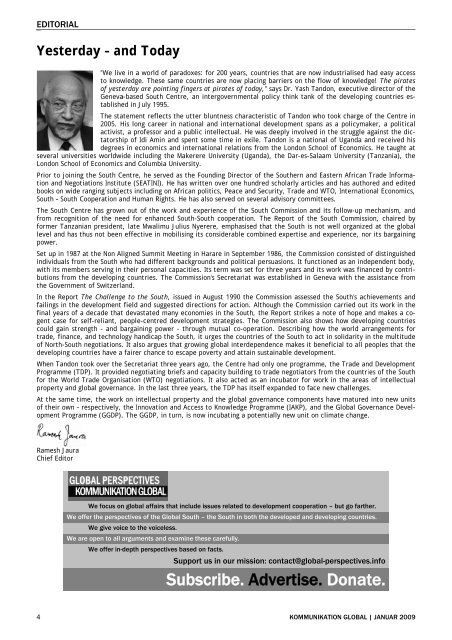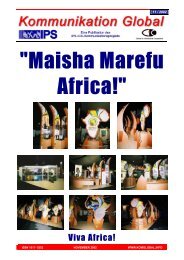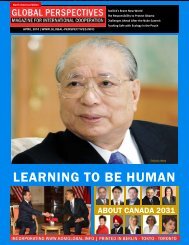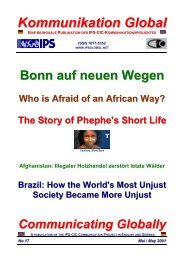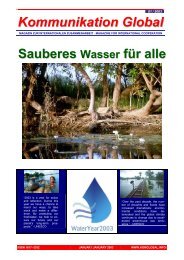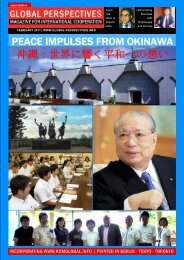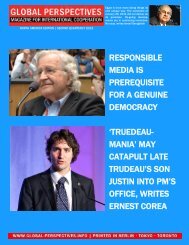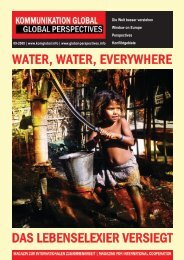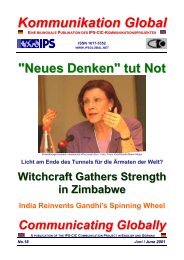GLOBAL PERSPECTIVES | KOMMUNIKATION GLOBAL - 01 | 2009
GLOBAL PERSPECTIVES | KOMMUNIKATION GLOBAL - 01 | 2009
GLOBAL PERSPECTIVES | KOMMUNIKATION GLOBAL - 01 | 2009
Create successful ePaper yourself
Turn your PDF publications into a flip-book with our unique Google optimized e-Paper software.
EEDITORIAL<br />
YYesterdday<br />
– annd<br />
Todday<br />
The staatement<br />
refleccts<br />
the utter bluntness cha aracteristic of Tandon who took charge of o the Centre in<br />
2005. HHis<br />
long careeer<br />
in national and internat tional developpment<br />
spans aas<br />
a policyma aker, a politiccal<br />
activistt,<br />
a professor and a public intellectual. He was deeplly<br />
involved in the struggle against a the diic<br />
tatorshiip<br />
of Idi Aminn<br />
and spent soome<br />
time in exile. e Tandonn<br />
is a nationall<br />
of Uganda and a received hhis<br />
degreess<br />
in economiccs<br />
and internaational<br />
relatio ons from the LLondon<br />
School<br />
of Economic cs. He taught at<br />
seeveral<br />
universsities<br />
worldwiide<br />
including the Makereree<br />
University (U Uganda), the Dar-es-Salaamm<br />
University (Tanzania), the<br />
Loondon<br />
School of Economics and Columbiaa<br />
University.<br />
Prior<br />
to joiningg<br />
the South Ceentre,<br />
he servved<br />
as the Foounding<br />
Direct tor of the Souuthern<br />
and Eastern<br />
African Trade Informma<br />
tion<br />
and Negottiations<br />
Instituute<br />
(SEATINI). . He has writtten<br />
over one hundred h schollarly<br />
articles aand<br />
has autho ored and editeed<br />
boooks<br />
on wide ranging subjeects<br />
including on African poolitics,<br />
Peace and Security, Trade and WTTO,<br />
Internatio onal Economiccs,<br />
Soouth<br />
– South CCooperation<br />
and<br />
Human Rigghts.<br />
He has aalso<br />
served on several advisory<br />
committeees.<br />
The<br />
South Centre<br />
has grownn<br />
out of the wwork<br />
and experience<br />
of the<br />
South Commmission<br />
and itts<br />
follow-up mechanism, m and<br />
frrom<br />
recognition<br />
of the neeed<br />
for enhanced<br />
South-South<br />
cooperati ion. The Report<br />
of the Soouth<br />
Commission,<br />
chaired by<br />
foormer<br />
Tanzanian<br />
presidentt,<br />
late Mwalimmu<br />
Julius Nyerrere,<br />
emphasised<br />
that the South is not well organize ed at the globbal<br />
leevel<br />
and has tthus<br />
not been effective in mmobilising<br />
its considerable combined expertise<br />
and exxperience,<br />
no or its bargaining<br />
poower.<br />
Seet<br />
up in 1987 at the Non Alligned<br />
Summitt<br />
Meeting in HHarare<br />
in Sept tember 1986, the Commission<br />
consisted of o distinguisheed<br />
inndividuals<br />
fromm<br />
the South wwho<br />
had differrent<br />
backgrouunds<br />
and political<br />
persuasioons.<br />
It functioned<br />
as an inde ependent boddy,<br />
wwith<br />
its membeers<br />
serving in their personaal<br />
capacities. Its term was set s for three yyears<br />
and its wwork<br />
was fina anced by contri<br />
butions<br />
from the<br />
developingg<br />
countries. TThe<br />
Commissioon's<br />
Secretariat<br />
was establlished<br />
in Geneeva<br />
with the assistance froom<br />
thhe<br />
Governmennt<br />
of Switzerlaand.<br />
Inn<br />
the Report TThe<br />
Challengee<br />
to the Soutth,<br />
issued in AAugust<br />
1990 the t Commissioon<br />
assessed thhe<br />
South's ach hievements and<br />
faailings<br />
in the development field and suggested<br />
directions<br />
for action.<br />
Although the<br />
Commissioon<br />
carried out t its work in the<br />
final<br />
years of a decade thatt<br />
devastated mmany<br />
economies<br />
in the Sou uth, the Repoort<br />
strikes a noote<br />
of hope and a makes a cco<br />
geent<br />
case for sself-reliant,<br />
ppeople-centred<br />
developmennt<br />
strategies. The Commisssion<br />
also showws<br />
how developing<br />
countriies<br />
coould<br />
gain streength<br />
- and bbargaining<br />
powwer<br />
- throughh<br />
mutual co-o operation. Deescribing<br />
how the world ar rrangements ffor<br />
trrade,<br />
finance, , and technoloogy<br />
handicap the South, it urges the cou untries of the South to act in solidarity in<br />
the multitudde<br />
off<br />
North-South negotiations. . It also arguees<br />
that growinng<br />
global inter rdependence makes it beneeficial<br />
to all peoples p that the<br />
deeveloping<br />
couuntries<br />
have a fairer chancee<br />
to escape pooverty<br />
and att tain sustainabble<br />
developmeent.<br />
WWhen<br />
Tandon ttook<br />
over the Secretariat three<br />
years aggo,<br />
the Centre e had only onee<br />
programme, the Trade an nd Developmeent<br />
Programme<br />
(TDDP).<br />
It provideed<br />
negotiatingg<br />
briefs and caapacity<br />
building<br />
to trade neegotiators<br />
froom<br />
the countries<br />
of the Souuth<br />
foor<br />
the World Trade Organisation<br />
(WTO) negotiations. . It also acted d as an incubbator<br />
for workk<br />
in the areas s of intellectuual<br />
property<br />
and global<br />
governaance.<br />
In the laast<br />
three yearss,<br />
the TDP has s itself expandded<br />
to face neew<br />
challenges s.<br />
At<br />
the same time,<br />
the workk<br />
on intellectuual<br />
property aand<br />
the global<br />
governance components hhave<br />
matured d into new units<br />
off<br />
their own – respectively, the Innovatioon<br />
and Access to Knowledge e Programme (IAKP), and thhe<br />
Global Gov vernance Deveel-<br />
oppment<br />
Programme<br />
(GGDP). . The GGDP, in<br />
turn, is noww<br />
incubating a potentially nnew<br />
unit on cliimate<br />
change.<br />
Ramesh<br />
Jaura<br />
Chief<br />
Editor<br />
4<br />
"We livee<br />
in a world oof<br />
paradoxes: for 200 years s, countries thhat<br />
are now inndustrialised<br />
had h easy acceess<br />
to knowwledge.<br />
Thesee<br />
same countrries<br />
are now placing p barrieers<br />
on the floww<br />
of knowledge!<br />
The pirattes<br />
of yesteerday<br />
are poinnting<br />
fingers at pirates of today," says DDr.<br />
Yash Tandon,<br />
executive e director of the<br />
Genevaa-based<br />
South Centre, an intergovernme<br />
ental policy think<br />
tank of tthe<br />
developin ng countries ees<br />
tablisheed<br />
in July 1995.<br />
We focus onn<br />
global affairss<br />
that include issues<br />
related to t developmennt<br />
cooperationn<br />
– but go farth her.<br />
We offer<br />
the perspeectives<br />
of the GGlobal<br />
South – the South in both b the developed<br />
and deveeloping<br />
countri ies.<br />
We give voicce<br />
to the voiceeless.<br />
We are<br />
open to all aarguments<br />
andd<br />
examine theese<br />
carefully.<br />
We offer in-ddepth<br />
perspecctives<br />
based onn<br />
facts.<br />
Support us in our mi ission: contaact@global-pperspectives<br />
s.info<br />
Subsccribe.<br />
Advertise.<br />
Donat te.<br />
KOMMUNIKAATION<br />
<strong>GLOBAL</strong> | JANUAR 20009


